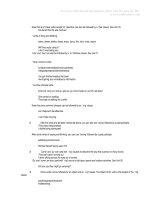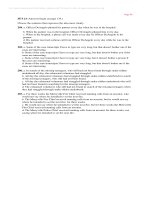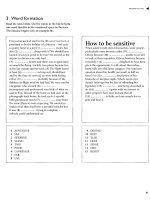New grammar practice part 7 ppt
Bạn đang xem bản rút gọn của tài liệu. Xem và tải ngay bản đầy đủ của tài liệu tại đây (55.84 KB, 10 trang )
Verbs
USE
• To talk about plans which are arranged for a particular time in the future. This
construction is used very often with come and go, and with verbs like see,
stay, visit, meet, etc:
They're going tomorrow.
I'm arriving next week.
We're visiting the States in three weeks.
Notes
• Remember that a time word or expression must be used, or understood from the
conversation, to make the present continuous a future.
• This is not just a 'near' future - it is possible to say: He's coming back in ten years.
Practice
Write these sentences in full, putting the verbs into the present continuous and
supply the missing words where necessary.
1 I / see / them / Saturday.
I'm seeing them on Saturday.
2 They / come / here / three weeks.
They're coming here in three weeks.
3 I / meet / John / three o'clock.
4 What / you do / Friday night?
5 I / go / to the disco / Saturday evening.
6 We / go back / to the States / three years.
7 They / go on holiday / two days' time.
8 I / not come home / Friday.
9 You / work late / tomorrow night?
10 We / not go to school / next week.
57
Verbs
11 He / come to see you / tomorrow.
12 Mr and Mrs Green / go away / three weeks.
13 We / have a party / Saturday.
14 I / see her again / next week.
15 You / play football / this week?
48 going to
58
FORM
Positive Question
Negative
I
He
She
It
We
You
They
am ('m)
is
('s)
are
('re)
going to
pay.
Am
Is
Are
I
he
she
it
we
you
they
going to pay?
I
He
She
It
We
You
They
am not
('m not)
is not
(isn't)
C's not)
are not
(aren't)
('re not)
going to pay.
USE
To talk about a planned future action:
I'm going to see my parents on Saturday.
(This use is similar to present continuous
time word Exercise 47.)
• To talk about something in the future which we can see as a result of
something happening now:
Look at those clouds. It's going to rain.
That man on the bike is going to fall off.
• To make statements about the future in a neutral way:
Alan's going to finish his exams on Friday.
Jenny's going to be five next week.
I'm going to work for a television company.
(The future simple is also used for the purpose > Exercise 50.)
Verbs
Practice
48a Write the correct form of going to to complete these sentences.
1 When (you] phone her?
2 (They not) stay very long.
3 What (you) say to your father?
4 (I not) pay anything.
5 (We) play tennis tomorrow?
6 (She) live in Mexico for a few months.
7 (The machine) work?
8 (Your parents) have a holiday this year?
9 (They) borrow some money from the
bank.
10 (I not) eat there again.
48b Write the correct form of going to and use one of these verbs to complete
the sentences. Use each verb once only.
finish complain fall off be miss
die «ift drive work fail
1 Look at those clouds! It
2 Look at the sun! It hot today.
3 Susan's not working very hard. I think she
her exams.
4 He's very angry. He to the manager.
5 It's nearly four o'clock. The lesson soon.
6 I don't like travelling by plane. I there.
7 This plan is too complicated. It (not)
8 The President's very ill. I think he
9 Watch the baby! She the bed!
10 This bus is very slow. I think we
the train.
59
Verbs
49 going to I Present Continuous + time word
CONTRAST
• It is often possible to use either tense:
I'm seeing them tomorrow. I'm going to see them tomorrow.
• The going to future is very common, especially in conversation.
If there is doubt about which of the two futures to use, it is better to use
going to.
• With the verbs go and come, it is better to use the present continuous.
• Present continuous + time word is generally used for plans arranged for a
particular time in the future.
Practice
In your notebook, supply the going to or present continuous future for these sen-
tences. If two answers are possible, write them both.
1 We at home tonight, (stay)
We're going to stay at home tonight./We're staying at home tonight.
2 Look at the sky. It tomorrow, (rain)
Look at the sky. it's going to rain tomorrow.
3 We at a restaurant tonight, (eat)
4 They to Manchester tomorrow morning, (drive)
5 I my teeth, have a wash, and go to bed. (brush)
6 Be careful with that plate! You it! (break)
7 My parents with us for the weekend, (stay)
8 Who's him the news? (tell)
9 Hurry up! We the train! (miss)
10 How many people today? (arrive)
11 They Nick at 10 o'clock tomorrow, (see)
12 I to the seaside next weekend, (go)
13 Who to John's party later? (come)
14 Bring your hat and gloves - it cold later tonight, (get)
15 Mary to Barbados next Tuesday, (fly)
16 Our friends us before the concert, (meet)
17 We into our new house next month, (move)
60
Verbs
50 Future Simple
FORM
Positive
Question
Negative
Shall/will
Will
Shall/will
Will
I
he
she
it
we
you
they
stay?
T
He
She
It
We
You
They
will not
(won't)
stay.
Notes
• the negative contraction = won't.
• shall is not used very often now. We generally use it only as a first person
question (= with / or we) to make suggestions and offers:
Shall I carry your suitcase for you?
Shall we go to a restaurant ?
USE
• For a statement of future fact. This can be
a] certain:
They'll be here on Saturday afternoon.
The journey will take six hours.
b) uncertain:
I think, it 'II rain tomorrow.
I'm not sure he'll be there.
Going to can also be used for this purpose > Exercise 48.
• For a sudden decision to do something (usually used with / or we):
No one's offered to help? I'll do it for you!
Wait a minute - I'll open the door for you,
I think I'll have eggs and chips please.
• To show willingness to do or not to do something in the future (often as a
promise or a threat):
I promise I'll be there.
I'll never speak to him again.
He says he'll send the money.
> Exercise 58 for future simple in conditional sentences.
> Exercise 53 for future simple + when, as soon as, etc.
61
I
He
She
It
We
You
They
will
('ll)
stay.
Verbs
Practice
Write these sentences, putting the verbs into the future simple.
1 I'm sure he (not be] late.
I'm sure he won't be late,
2 [I open) the window for you?
Shall I open the window for you?
3 How long (the journey take?)
4 1 suppose (she be) in London next week.
5 John (phone) your office for you.
6 (There be) a lot of people at the meeting?
7 What time (the race start?)
8 He (never agree) to your idea.
9 You (never see) your money again.
10 What's the matter? (I phone) the doctor?
11 Don't worry. I (pay) for the damage to your car.
12 (You be) at home tomorrow?
13 The company (not give) you an extra day's holiday.
14 Don't touch that! You (hurt) yourself!
15 There (not be) any newspapers tomorrow.
62
Verbs
51 going to-future plan, and will- sudden decision
CONTRAST
• In conversation, going to is often used to indicate a future plan that has been
made before the time of speaking:
I'm going to see Pat tomorrow - we arranged it this morning.
* Will is often used to indicate a sudden decision, made at the time of speaking:
How can we get to the airport? I know! I'll borrow Sue's car!
Practice
Write the correct form of going to or will to complete the dialogue.
LAURA: What are you doing this weekend, Jan?
TANYA:
I 'm
going
to see (see) a new play tomorrow at the
Royal Court Theatre - 'Day of the Flood'.
LAURA: Have you got the tickets yet?
TANYA: NO, I (get) them this afternoon,
actually. Would you like to come?
LAURA: Oh, thank you, that would be nice.
TANYA: OK, I (get) you a ticket too.
LAURA: Great what time does it start?
TANYA: Eight o'clock, but we (all meet) in
the Green Cafe at 7.15
LAURA:OK, I (meet) you in the cafe, but, er
I (be) there about half-past seven.
TANYA: That's fine.
LAURA: Oh, one other thing I've got no money at the moment I
(pay) for the ticket on Saturday. Is that OK?
TANYA: Yes, that's OK, no problem.
LAURA: (you eat) in the cafe, or just have a
cup of coffee?
TANYA: Just a coffee I think
9
LAURA: Look, (we go) to a restaurant after the
show? I know a very good Chinese restaurant
TANYA: That's a good idea - I (phone) the
others and see if they want to come too.
LAURA: Good, and then I (book) a table
Great! I (see) you tomorrow.
63
Verbs
52 going to and will
CONTRAST
• Sometimes it is possible to use either going to or will, but at other times
only one of them is correct:
going to
will
going to
or mill
1
2
1
2
3
1
2
3
future plan - decided
before time of speaking
future result from
present evidence
future willingness
sudden decision made
at time of speaking
offer/suggestion
neutral future fact
1
first conditional
1
when/as soon as, etc.
1
ex
ex
ex
ex
ex
ex
ex
ex
ex
51
48
50
51
50
48
50
58
53
I'm going to leave next week.
He's going to fall off his bike.
I won't do it.
I'll phone her now,
Shall I open the door for you?
Danny's going to be eight next week.
Danny will be eight next week.
If it rains, we're going to leave.
If it rains, we'll leave.
I'm going to phone when I arrive.
I'll phone when I arrive.
'will is more common here.
Practice
Write the correct form of going to, shall, or mill for these sentences. If two
answers are possible, write the more likely one.
1 'Why is Sheila getting a passport?'
'She .''s going to. live in Spain for a year.'
2 'I know she won't. (not) agree with this idea.'
3 'I think the film be a big success.'
4 'I don't feel very well this morning.'
'Oh, dear I look after the children for you?'
5 The managing director sack two hundred people
next month.
6 'There's someone at the door.' 'OK, I answer it.'
7 She never see her parents again.
64
Verbs
8 'Is that your new stereo?'
'Yes, but it doesn't work. 1 to take it back to the shop.
9 I think the exam be quite easy.
10 'I see Hannah and Peter together a lot.'
'Yes. They get married.'
11 You probably have a really good time.
12 The dog looks ill. I think it be sick.
13 What (you) do this weekend?
14 I see a late-night horror film at the Odeon.
15 You don't have to walk: T give you a lift.
16 I've had enough of this job. I leave.
17 Of course we help you.
53 when + Present Simple to describe the future
FORM
when +
When
As soon as
Before
After
If / Unless
present simple
I see him.
future simple
T'll phone you.
USE
The present simple is used in clauses of time and condition (after when,
as soon as, if, etc.) to refer to the future.
until is similar:
future simple +
I'll wait
until
until
+ present simple
I see him.
Notes
• Note the use of the present simple above:
(NOT When I'll see him I'll phone you.)
(NOT I'II wait until I'll see him.)
• The present perfect can also be used with when, etc: I'll speak to you when I've finished.
• Going to or the imperative can be used, when appropriate, instead of the future simple:
I've decided what to do. I'm going to talk to him when he gets here. Phone me when
he arrives.
65
Verbs
Practice
Write these sentences, putting the verbs into the future simple or present simple.
1 1 (give) it to them when they (visit) us.
/'// give it to them when they visit us.
2 T (not send) the parcel until I (hear) from you.
/ won't send the parcel until I hear from you.
3 As soon as they (phone) me, I (contact) you.
4 I (see) you before I (fly) to Paris.
5 They (send) you the money before they (leave).
6 When I (talk) to him, I (give) him your news.
7 She (visit) her parents before she (go) to the airport.
8 I (finish) this when I (be) at the office.
9 I (send) you a postcard when I (get) to Bermuda.
10 She (do) her homework before she (go) out.
11 After I (visit) the hospital, I (go) and see her parents.
12 1 (phone) Mary when we (get) to San Francisco.
13 1 (call) you as soon as we (sign) the contract.
14 He (not do) anything before you (tell) him to.
15 You (be) very surprised when you (meet) him.
66









